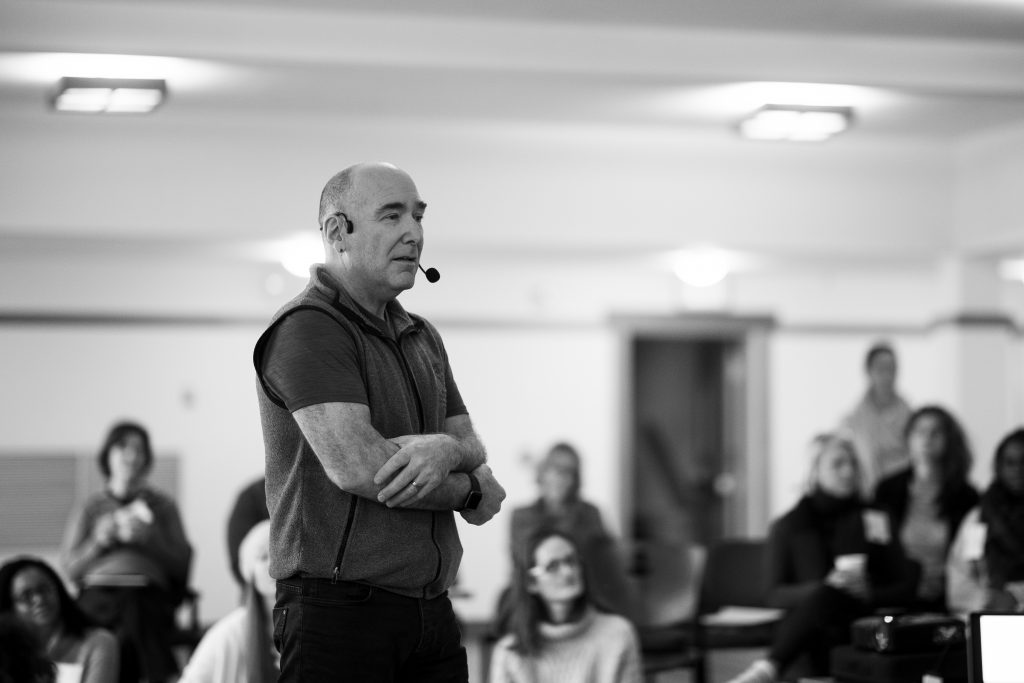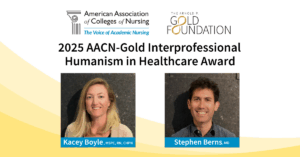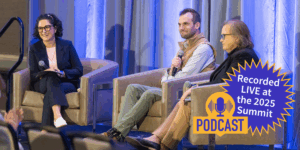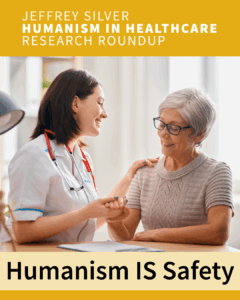“8 Questions” is a Gold Foundation series spotlighting members of the Gold community – doctors, nurses, healthcare professionals of all kinds, students, corporate and hospital leaders, patients, family members, Trustees, staff members, and supporters.
We are delighted to introduce you to Dr. Mick Krasner, physician-author, Co-Founder of Mindful Practice, and Professor Emeritus at the University of Rochester. Dr. Krasner was one of the featured speakers at the 2024 Gold Humanism Summit.
 Dr. Krasner has taught Mindfulness-Based programs to over 4,000 participants, including patients, medical students, and more than 2,000 health professionals for more than 23 years. He was the project director of Mindful Communication: Bringing Intention, Attention, and Reflection to Clinical Practice, with results reported in JAMA in September 2009. This led to the establishment of Mindful Practice Programs, which he co-directs, at the University of Rochester. The program has provided continuing education to health professionals locally and internationally for the past 14 years, including a multi-year teacher training program for future facilitators.
Dr. Krasner has taught Mindfulness-Based programs to over 4,000 participants, including patients, medical students, and more than 2,000 health professionals for more than 23 years. He was the project director of Mindful Communication: Bringing Intention, Attention, and Reflection to Clinical Practice, with results reported in JAMA in September 2009. This led to the establishment of Mindful Practice Programs, which he co-directs, at the University of Rochester. The program has provided continuing education to health professionals locally and internationally for the past 14 years, including a multi-year teacher training program for future facilitators.
Dr. Krasner’s personal mission is centered on supporting the flourishing of health professionals. He envisions a personalized health professional-patient relationship where healing is truly bidirectional, care goals are mutually derived, and the uniqueness of the clinical encounter reflects the central act of mutual high regard.
What drew you to the field of healthcare?
I am curious about this question for me and many of my colleagues, and have asked many colleagues, students, and acquaintances in healthcare the same, often discovering a common origin story for so many about personal encounters with illness, loss, suffering of oneself or someone close. And the same could be said to be true for me, having had a sibling with a life-limiting illness among other early experiences.
However, I think underneath this question, I must admit there is something more biologic and physiologic that I experience when caring for others. I suppose scientists would understand it in terms of the reinforcers of prosocial and compassionate actions such as oxytocin and other biochemicals, evolutionarily preserved and strengthened for the survival reasons for our social species. So, I must say it is that feeling that occurs when engaged in acts of caring and compassion, and knowing that in healthcare there is so much potentially of that going around that drew me and keeps me in healthcare.

Dr. Krasner hosting a mindfulness retreat. Photo credit: Brett Carlsen
What is one lesson you learned from a patient?
There are so many lessons, so I am going to try to try to drop a bit underneath this question, too. I think with over 30 years of primary care internal medicine clinical practice I have learned from patients that healing is rarely about fixing or curing. That healing for them is not an end, but something to live into. That healing for them is about how to come to terms with things as they are and live the best life that can be lived given the conditions as they exist. It has been an inspiring lesson, and one that I, too, hope to live into myself.
What is one book you’d recommend to patients and/or fellow clinicians?
There are so many great books that I have loved, and I know colleagues and patients would love, too. So, I must choose one, right? Well, one among many is Abraham Verghese’s first book, My Own Country. This book about his experience in eastern Tennessee during the early days of AIDS touched me as I think it would touch many readers in its honesty, poignancy, and intimacy about the human condition.
Among the themes that affected me and the way I practice medicine, and live my life, include the dynamics of othering, feeling exiled, the power of human connection, and the importance of human contact for every one of us.
What do you think is the most urgent threat to humanism in healthcare?
I think the tension between healthcare financing and the practice of medicine underlies a significant threat to humanism in medicine. The fallout of this tension and the very challenging related issues of access, innovation, market-pressures, and even private equity interests in not only healthcare-related product development but also clinical services delivery have squeezed clinical professionals and the educational processes that train them.
These pressures have created a healthcare delivery industry that is dehumanized, focused on bottom-line productivity for the short-term, while devaluing the humanistic roots central to a life of purpose, meaning, and connection.
What is one thing you do every day to care for your well-being?
I try each day to write something. It may be an email. It may be a card or letter to a friend or family member. It may be a blog post I am working on. It may be something technical for a talk I am giving. In order to write anything, I must first reflect. In order to reflect, I must first pause. The pause that leads to reflection then informs actions that support my well-being by providing the space between stimulus and response. In this way, I learn the habit of pausing, so I can be more aware of my next action and hopefully do less harm and more good, toward myself and toward others.
What is one of your favorite medical facts?
I suppose it is a medical fact, but I find the origin of the word CELL quite fascinating. The British scientist and natural philosopher Robert Hooke when looking at cork under a microscope saw that the cork had a series of shallow, walled boxes or “pores.” The small boxes reminded Hooke of the rooms that monks stayed in, which were called cellula.
Hooke wrote about and illustrated what he saw under the microscope in his 1665 book Micrographia: Or Some Physiological Descriptions of Minute Bodies Made by Magnifying Glasses with Observations and Inquiries.
From that point on, the word cell has been used to describe the smallest functional unit capable of life. And metaphorically, as the monks were engaged in theological contemplations in their cellula, each one of us in healthcare engage in a collective contemplation on the nature of suffering, the nature of healing, and the nature of being human.
What is one thing that the Gold community would be most surprised to learn about you?
When I was a second-year medical student, two friends of mine (one a medical student and the other an early childhood friend) and I hopped on a freight train in Oakland, California, which carried us to Salt Lake City, Utah. Meeting hobos and other interesting folks along the way, we successfully made our way back (it’s not like one can simply find a return trip to one’s originating point of departure) to San Bernardino, California, and then somehow made it back to classes the following Monday.
I am not sure what impact that experience had on my career, but as they say, everything one has done in one’s life, planned for, sacrificed for, all that has been experienced has in a very real way brought one to this very moment. Difficult to argue with that. For me, even the freight train experience has been part of the journey that has literally brought me to the computer screen right now, writing these very words about that experience.
If you were stranded on a desert island for a week, what three items would you want with you?
I am going to assume that food and shelter and other basic needs have been provided for in this very unlikely scenario. So, the question for me seems to be what would “help” me manage the loneliness, perhaps boredom, and maybe fear that might arise?
It would be easy to ask for 1) an iPhone, 2) with internet access, and 3) an active Spotify account. But that is too easy. I think I would be able to handle the experience quite well, knowing first that the basic needs are taken care of and that I will be rescued in 1 week, with 1) a pad of paper- waterproof in case of rain, 2) a fine writing pen, and 3) ink refills for the pen.
With those items I could 1) reflect more and write my reflections down (I spoke about that earlier), 2) draw some, although I do not fancy myself as having great skill with drawing, but I could learn, and 3) allow creativity to take whatever form it might for that week, and then reflecting more on that through writing.
Thank you, Dr. Krasner! Read more interviews in the “8 Questions” series.


